北师大版(2019)必修三Unit 7 Art Lesson 2 Beijing Opera 课件(11张ppt)
文档属性
| 名称 | 北师大版(2019)必修三Unit 7 Art Lesson 2 Beijing Opera 课件(11张ppt) |
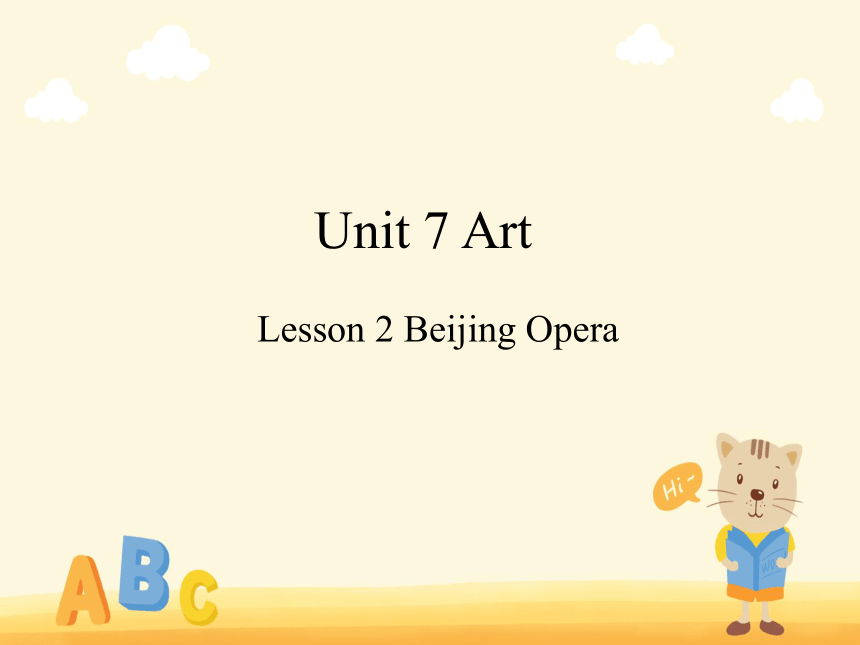
|
|
| 格式 | pptx | ||
| 文件大小 | 743.3KB | ||
| 资源类型 | 教案 | ||
| 版本资源 | 北师大版(2019) | ||
| 科目 | 英语 | ||
| 更新时间 | 2022-10-22 00:00:00 | ||
图片预览

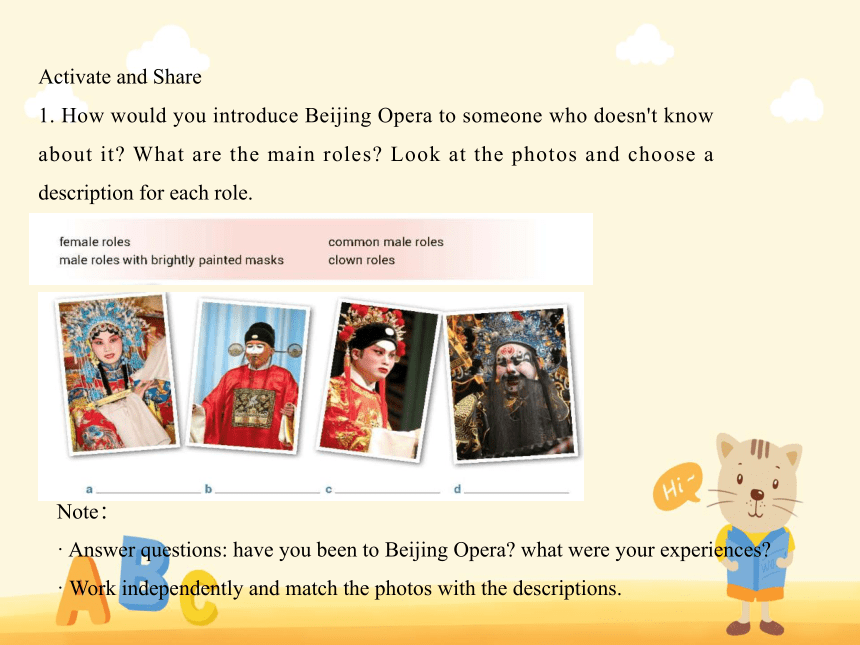
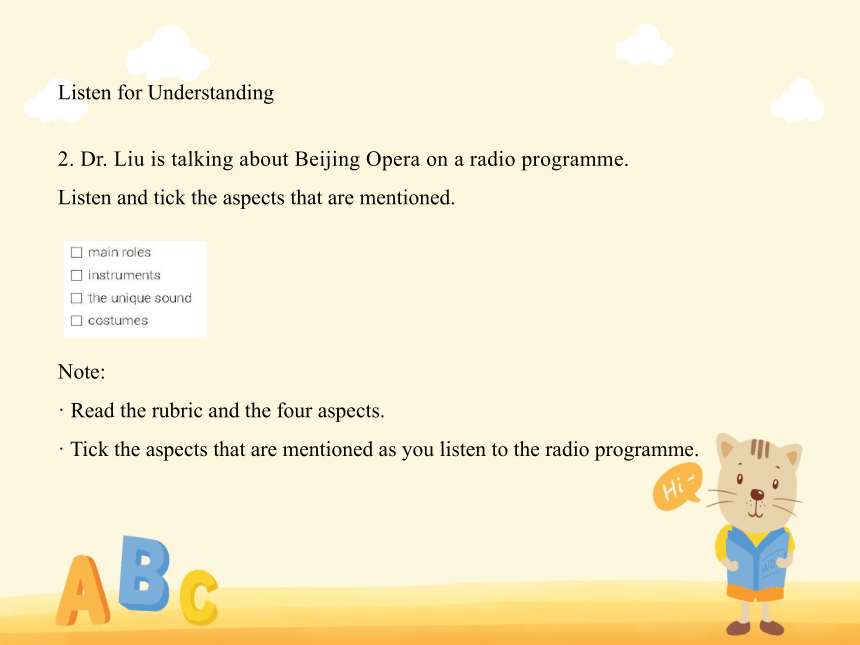
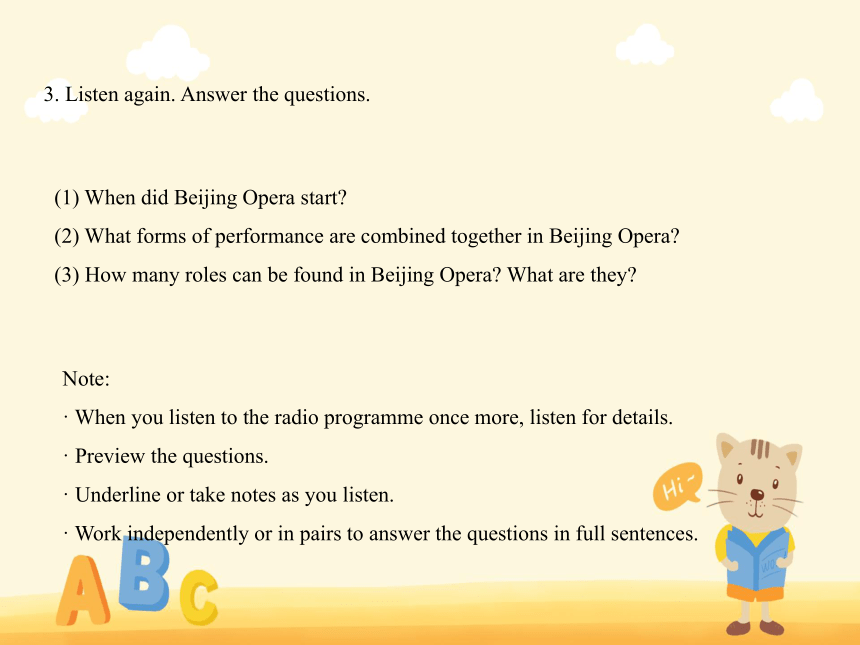
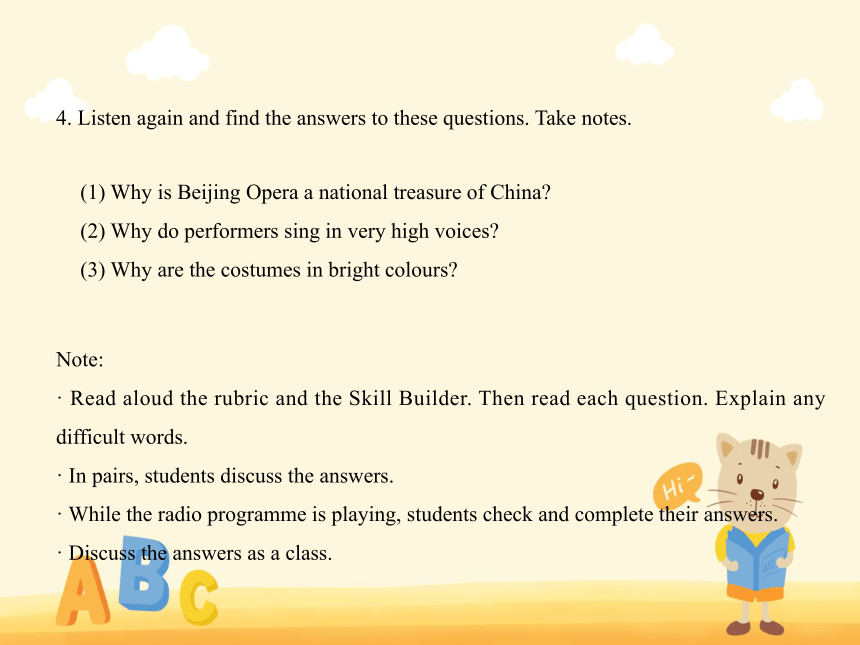
文档简介
(共11张PPT)
Unit 7 Art
Lesson 2 Beijing Opera
Activate and Share
1. How would you introduce Beijing Opera to someone who doesn't know about it What are the main roles Look at the photos and choose a description for each role.
Note:
· Answer questions: have you been to Beijing Opera what were your experiences
· Work independently and match the photos with the descriptions.
2. Dr. Liu is talking about Beijing Opera on a radio programme. Listen and tick the aspects that are mentioned.
Note:
· Read the rubric and the four aspects.
· Tick the aspects that are mentioned as you listen to the radio programme.
Listen for Understanding
Note:
· When you listen to the radio programme once more, listen for details.
· Preview the questions.
· Underline or take notes as you listen.
· Work independently or in pairs to answer the questions in full sentences.
3. Listen again. Answer the questions.
(1) When did Beijing Opera start
(2) What forms of performance are combined together in Beijing Opera
(3) How many roles can be found in Beijing Opera What are they
4. Listen again and find the answers to these questions. Take notes.
Note:
· Read aloud the rubric and the Skill Builder. Then read each question. Explain any difficult words.
· In pairs, students discuss the answers.
· While the radio programme is playing, students check and complete their answers.
· Discuss the answers as a class.
(1) Why is Beijing Opera a national treasure of China
(2) Why do performers sing in very high voices
(3) Why are the costumes in bright colours
Note:
· Read the rubric. Revise the Skill Builder.
· In pairs, listen and take note of the key phrases used by Dr. Liu to give reasons.
· Review the answers as a class.
· A class discussion will be created on the your opinion of Beijing Opera. You need to provide your opinion and support with logical reasoning.
5. Listen again. List the key phrases used by Dr. Liu to give reasons. Then, talk about whether you like Beijing Opera. Give your reasons.
Note:
· The class will be divided into five groups. Each group discusses one of the below topics in relation to Beijing Opera: the four roles, costumes and masks, sound and singing, history and interesting features.
· Each group selects one person to be the scribe and write down notes for the group.
· Each one in the group describes the chosen topic. The scribe can mind map this information.
· Each group writes a few complete sentences about their topic on Beijing Opera using these descriptions.
6. Introduce Beijing Opera to a group of students from another country.
Focus on Function: Expressing Emotions (2)
Note:
· Read the rubric and.
· In pairs, answer the questions in full sentences.
7. Listen to a dialogue about Beijing Opera. Answer the questions.
(1) Who went to see Beijing Opera
(2) How did the person feel about it
(3) What didn't the person understand
Note:
· Read aloud the rubric and the Talk Builder box as a class. Explain any unknown terms.
· Tell students that they will listen to the dialogue for more detail.
· As students listen to the dialogue, they need to identify the emotion for each sentence in the brackets.
8. Listen and imitate. What emotions do the speakers express Write satisfaction, worry or regret after the sentences in the Talk Builder.
Note:
· Watching a short local opera. You need to take note of the roles, costumes and masks, sound and singing, history and interesting features.
· The class will be divided into pairs. Role play a dialogue between a Chinese student and a foreign student.
· A is role-playing a Chinese student, who understands the different elements of opera. B is role-playing a foreign student, who does not understand opera and asks questions.
· In pairs, first write down five questions that a foreign student would ask about the opera; then you provide responses in a script format.
Speak
9. Pair Work Act out a dialogue between a Chinese student and a foreign student after watching a local opera.
THANK YOU
Unit 7 Art
Lesson 2 Beijing Opera
Activate and Share
1. How would you introduce Beijing Opera to someone who doesn't know about it What are the main roles Look at the photos and choose a description for each role.
Note:
· Answer questions: have you been to Beijing Opera what were your experiences
· Work independently and match the photos with the descriptions.
2. Dr. Liu is talking about Beijing Opera on a radio programme. Listen and tick the aspects that are mentioned.
Note:
· Read the rubric and the four aspects.
· Tick the aspects that are mentioned as you listen to the radio programme.
Listen for Understanding
Note:
· When you listen to the radio programme once more, listen for details.
· Preview the questions.
· Underline or take notes as you listen.
· Work independently or in pairs to answer the questions in full sentences.
3. Listen again. Answer the questions.
(1) When did Beijing Opera start
(2) What forms of performance are combined together in Beijing Opera
(3) How many roles can be found in Beijing Opera What are they
4. Listen again and find the answers to these questions. Take notes.
Note:
· Read aloud the rubric and the Skill Builder. Then read each question. Explain any difficult words.
· In pairs, students discuss the answers.
· While the radio programme is playing, students check and complete their answers.
· Discuss the answers as a class.
(1) Why is Beijing Opera a national treasure of China
(2) Why do performers sing in very high voices
(3) Why are the costumes in bright colours
Note:
· Read the rubric. Revise the Skill Builder.
· In pairs, listen and take note of the key phrases used by Dr. Liu to give reasons.
· Review the answers as a class.
· A class discussion will be created on the your opinion of Beijing Opera. You need to provide your opinion and support with logical reasoning.
5. Listen again. List the key phrases used by Dr. Liu to give reasons. Then, talk about whether you like Beijing Opera. Give your reasons.
Note:
· The class will be divided into five groups. Each group discusses one of the below topics in relation to Beijing Opera: the four roles, costumes and masks, sound and singing, history and interesting features.
· Each group selects one person to be the scribe and write down notes for the group.
· Each one in the group describes the chosen topic. The scribe can mind map this information.
· Each group writes a few complete sentences about their topic on Beijing Opera using these descriptions.
6. Introduce Beijing Opera to a group of students from another country.
Focus on Function: Expressing Emotions (2)
Note:
· Read the rubric and.
· In pairs, answer the questions in full sentences.
7. Listen to a dialogue about Beijing Opera. Answer the questions.
(1) Who went to see Beijing Opera
(2) How did the person feel about it
(3) What didn't the person understand
Note:
· Read aloud the rubric and the Talk Builder box as a class. Explain any unknown terms.
· Tell students that they will listen to the dialogue for more detail.
· As students listen to the dialogue, they need to identify the emotion for each sentence in the brackets.
8. Listen and imitate. What emotions do the speakers express Write satisfaction, worry or regret after the sentences in the Talk Builder.
Note:
· Watching a short local opera. You need to take note of the roles, costumes and masks, sound and singing, history and interesting features.
· The class will be divided into pairs. Role play a dialogue between a Chinese student and a foreign student.
· A is role-playing a Chinese student, who understands the different elements of opera. B is role-playing a foreign student, who does not understand opera and asks questions.
· In pairs, first write down five questions that a foreign student would ask about the opera; then you provide responses in a script format.
Speak
9. Pair Work Act out a dialogue between a Chinese student and a foreign student after watching a local opera.
THANK YOU
同课章节目录
- Unit 7 Art
- Lesson 1 Masterpieces
- Lesson 2 Beijing Opera
- Lesson 3 A Musical Genius
- Unit 8 Green living
- Lesson 1 Roots and Shoots
- Lesson 2 Greening the Desert
- Lesson 3 "White Bikes" on the Road
- Unit 9 Learning
- Lesson 1 Active Learning
- Lesson 2 Language Learning Tips
- Lesson 3 The Secrets of Your Memory
